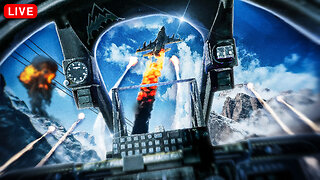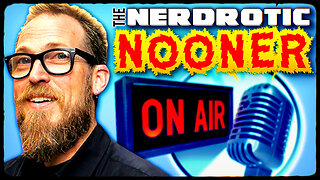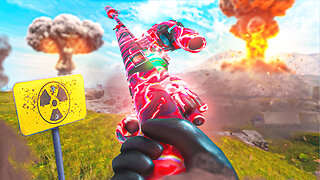Premium Only Content

'The Fourth Protocol' (1987) Movie of the Book by Frederick Forsyth
This is the 9th Harry Palmer installment (Frederick Forsyth admitted the protagonist, played by Michael Caine, is Harry Palmer). The audiobook, 'The Fourth Protocol' by Frederick Forsyth, is on this channel in the Frederick Forsyth series.
'The Fourth Protocol' (1987), directed by John Mackenzie and based on the 1984 novel by Frederick Forsyth, is a Cold War thriller that strives to merge realism with high-stakes suspense, though it ultimately struggles under the weight of its contradictions. With a cast led by Michael Caine and Pierce Brosnan, the film situates itself firmly in the realm of late-period espionage fiction, where the ideological lines have blurred and the machinery of intelligence has become almost as dangerous as the enemy it claims to oppose.
At its core, the film depicts a clandestine Soviet operation intended to detonate a nuclear bomb near an American airbase in Britain, thereby making the explosion appear accidental and sparking political upheaval. The plan is meant to circumvent the titular Fourth Protocol—an actual (though secretive) agreement prohibiting the placing of nuclear weapons on foreign territory without notification. It is a plot that plays into the dark anxieties of the Cold War: not the fiery apocalypse of total war, but the subtler sabotage of treaties and trust.
Michael Caine plays John Preston, a disillusioned yet capable British counterintelligence officer who begins to suspect that something is wrong within the system. Caine brings to the role a kind of battered integrity; he is a man who has seen too much and believes too little, but continues to do his job with a mixture of sarcasm and determination. His adversary is Valeri Petrofsky, played by a cold and impassive Pierce Brosnan, whose performance deliberately lacks warmth or character. Petrofsky is not a Bond villain, nor a charismatic Soviet agent; he is methodical, quiet, and ruthless—a bureaucrat with a pistol.
What sets the film apart from more flamboyant spy fare is its refusal to glamorise espionage. It treats intelligence work as a grinding, often tedious business of surveillance, deduction, and institutional infighting. The Soviet plot unfolds with near-surgical precision, each component of the bomb smuggled into the country separately, the pieces assembled with chilling patience. Meanwhile, Preston must fight not only foreign agents but his own superiors, particularly a bureaucratic and self-serving intelligence chief played by Julian Glover. This internal friction is where the film offers its sharpest critique—not of communism, but of the ossified structures within British intelligence.
Visually, the film is grey and cold. There is little in the way of cinematic flair or action-driven momentum. Much of it takes place in drab offices, anonymous streets, and countryside safehouses. This muted palette serves the realism but also flattens the drama. For a story involving nuclear weapons and international conspiracy, the film is curiously subdued. The tension is there, but it simmers rather than explodes.
There are moments when the film lifts its head above the procedural tone to deliver something more engaging. Caine’s scenes have a weary charisma, and the sequence in which the full scope of the Soviet plan is finally revealed carries genuine weight. But these are brief flashes. Brosnan’s character remains opaque, a cipher rather than a character. He is terrifying in his stillness, but this also robs the film of dramatic contrast. There is no ideological clash, only cold mechanics on both sides.
The most interesting element of the film—one that is perhaps not fully explored—is the implicit suggestion that the Western intelligence services are as compromised, hierarchical, and suspicious of their own as their Soviet counterparts. Preston’s loyalty is constantly questioned, his actions undermined by those above him. In this sense, 'The Fourth Protocol' shares something with the world of John le Carré, though Forsyth’s tone is less melancholic and more technocratic.
By the time the final act arrives, and the bomb plot is foiled, the film has achieved a kind of quiet resolution. There is no grand shootout, no cathartic showdown. Instead, the tension diffuses into a grim sense of inevitability. Preston wins, not because of trust or teamwork, but in spite of the system he works for. The danger, we are left to understand, lies not just in the Soviet threat, but in the complacency and arrogance of the institutions meant to protect us.
In conclusion, 'The Fourth Protocol' is a restrained and serious espionage film that prioritises detail and plausibility over spectacle. It offers a sober look at the machinery of intelligence, one that is more interested in procedure than personality. While its commitment to realism lends it credibility, it also saps it of emotional engagement. The performances are solid, the premise chillingly plausible, but the film remains a cerebral experience rather than a gripping one. It may not ignite the screen, but it leaves a lingering unease—the sense that the world of spies is not one of heroes and villains, but of shadows, mistakes, and men who no longer believe in what they’re doing.
-
 LIVE
LIVE
Dr Disrespect
3 hours ago🔴LIVE - DR DISRESPECT - TRIPLE THREAT CHALLENGE - WINNING AT EVERYTHING
18,005 watching -
 46:25
46:25
The Quartering
3 hours agoMeta PC Winner, Trump Ruins Libs Dark Fantasy & Raja Jackson Case Heats Up!
89.1K36 -
 LIVE
LIVE
Rallied
2 hours ago $1.15 earnedWarzone Challenges w/ Doc & Bob
432 watching -
 LIVE
LIVE
StoneMountain64
1 hour agoNew Missions for Battlefield 6 Unlocks (+New Mouse and Keyboard)
52 watching -
 2:09:47
2:09:47
Nerdrotic
6 hours ago $3.73 earnedHollywood's Long Dark Summer of the Soul - Nerdrotic Nooner 511
37.9K1 -
 1:36:05
1:36:05
Side Scrollers Podcast
3 hours agoStreamer ATTACKS Men Then Cries Victim + Pronoun Rant Anniversary + More | Side Scrollers
17K -
 12:06
12:06
Liberty Hangout
1 day agoDemocrat Woman Can't Define 'Woman'
33.2K68 -
 LIVE
LIVE
GritsGG
6 hours agoRumble Customs! 3515 Ws! 🫡!
341 watching -
 38:39
38:39
Grant Stinchfield
4 hours ago $1.39 earnedHow Local TV News LOST Its Soul
18.4K3 -
 2:09:51
2:09:51
Badlands Media
15 hours agoBadlands Daily: Sept. 1, 2025 – Trump vs. Big Pharma, Giuliani Crash, and Mortgage Fraud Fallout
59.1K36